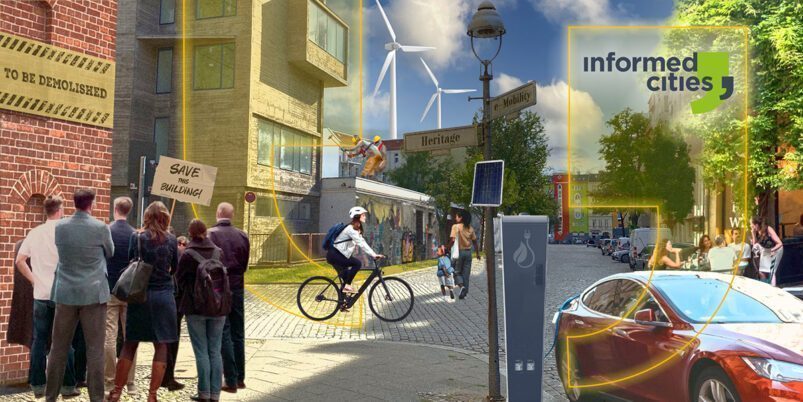How can cultural heritage and e-mobility be the common theme for a conference? What brings these seemingly very different topics together, and how will they both shape our cities in the future?
The Informed Cities initiative, which makes research work for local sustainability, is a European initiative driven by ICLEI – Local Governments for Sustainability. The initiative aims to bridge the gap between research, policy-making and action in sustainable development, at and for the local level. The Informed Cities Forum (ICF) is an established “un-conference” enabling urban practitioners to learn from the present and collaboratively plan for the future in the most unusual spaces. This year will mark the first fully online Informed Cities Forum; experimenting with
virtual co-creation spaces and digital networking.
The 9th edition of the Informed Cities Forum is scheduled to take place online between the 26 and 28 of October 2021, under the title “Re-purpose. Re-charge. Re-think. Heritage and e-mobility at the crossroads.” Experimenting with interactive digital tools and formats, the 9th Informed Cities Forum promises not to be “just another online conference,” but instead a space for meaningful dialogue and exchange. This edition is co-hosted by the Horizon 2020 projects OpenHeritage and GreenCharge, bringing together dreamers, thinkers and doers from the fields of adaptive reuse of cultural heritage and electric mobility. The forum will be an unconventional cross-sectoral discussion, inviting participants to look at urban sustainability from many different perspectives.
On the occasion of the launch of registrations to the 9th Informed Cities Forum, we at the European Heritage Tribune have hand-picked the most relevant sessions for heritage aficionados, which will feature inspiring speakers and case studies across Europe:
New European Bauhaus: Adaptive reuse of cultural heritage
The New European Bauhaus (NEB) aims to make the places in which we live more sustainable, inclusive and beautiful. In this context, speakers and participants will discuss the questions this poses, like: What is the role of adaptive reuse of cultural heritage in this goal? How are different cities repurposing historic buildings to address the needs of local communities? This session focuses on the pivotal role of cultural heritage in the success of the NEB movement, presenting
overarching principles and concrete local interventions.
Knowledge Cafe: What did Heritage Communities learn from the pandemic?
The COVID-19 pandemic radically affected the ways that heritage communities operate. Using a flexible virtual space and interactive formats, this session will bring participants to the table in discussions led by OpenHeritage Labs. Group discussions will explore lessons learned in different contexts, including: the Rome Collaboratory (Italy), Sunderland High Street West (UK), Hof Prädiköw (DE), Praga Lab (PL), Pomáz-Nagykovácsi-puszta (HU) and Marquês de Abrantes (PT). Collaborative governance frameworks, diversified funding streams and participatory community engagement processes are shaping local post-COVID realities in exciting ways!
European Year of Rail: Repurposing obsolete transportation infrastructure
On the occasion of the European Year of Rail, this session explores places and cases where cultural heritage meets transportation infrastructure. How have shifting mobility cultures shaped urban heritage? How can bottom up initiatives, private interventions or public investments repurpose obsolete train stations, depots or railways? Participants can board one of the Informed Cities Forum’s digital wagons and discover different approaches to work at the intersection of mobility and heritage — including success stories and failures.
Accessibility of Cultural Heritage
The protection and promotion of cultural heritage is a human rights imperative for any future-proof city. The right to take part in cultural life spells out the right everyone holds to be able to access, participate in and enjoy culture, cultural heritage and cultural expressions. This session examines new approaches to meaningful accessibility and inclusion, exploring initiatives, technologies and policies for overcoming mobility and access limitations to cultural heritage,
with particular focus to marginalised groups and young people.
The Informed Cities Forum offers a chance not only to think about the way we physically move within our communities, but also to imagine how to move forward with cultural transitions to sustainability.
Ensure your virtual seat in the 9th Informed Cities forum by completing the registration form here.

